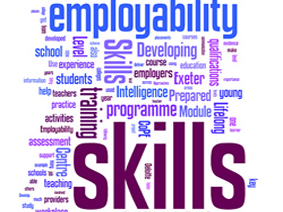Employability Skills
| Site: | Godalming Online |
| Course: | Study Skills |
| Book: | Employability Skills |
| Printed by: | Guest user |
| Date: | Monday, 23 December 2024, 12:40 AM |
Table of contents
- Introduction
- What is a Competency-Based interview?
- How to answer competency-based questions
- Communication Skills
- Managing projects and budgets
- Leading and teamwork skills
- Commitment to excellence
- Developing and using commercial and technical knowledge
- Learning, sharing and innovation
- Developing yourself and others
- Adaptability and open mindedness
- Building and sustaining relationships
- Demonstrating honesty, courage and integrity
- Summary and Review Worksheet
Introduction
 – Developing your Core Competencies -
– Developing your Core Competencies -
Probably without knowing it, every day you are developing skills which employers are looking for.
This short course looks at 10 of the Core Competencies which an employer might be looking for in a job applicant and helps you to analyse which of these you already have and which you may need to develop further.
During a job application process you may be asked to demonstrate how you have developed these qualities. By working through the questions in the Review Quiz worksheet at the end of this course, you will be better prepared for your future job applications. Not all the questions will be applicable for every job, but try to think of answers to all of them and keep your work to refer to in the future.
BREAK
To complete this course, you need to read through the separate competency chapters, and then complete and upload the Review worksheet of competency questions at the end.
You could open the worksheet now and have it ready to answer the questions as you work through each section of this course book, or you can complete it after you have finished reading all the sections.
BREAK
For further advice on developing these skills or preparing for job applications and interviews, contact the Careers department.
BREAK
BREAK
The ideas throughout this course are adapted from http://read.pwc.com/i/391324-employability-brochure.
What is a Competency-Based interview?
 - What...? -
- What...? -
Competency-based interviews feature questions designed to gauge your ability to handle the job and specific situations which might arise. Questions in this type of interview generally require you to demonstrate that you have the skills the employer is looking for by providing examples of situations you’ve faced in the past and what you did in those situations.
For example, you may be asked to discuss past projects that have succeeded and failed, how you’ve dealt with challenging co-workers or clients, or a time when you took a risk. Answering these questions gives the interviewer an idea of how you will fit into their business environment, whether it's an office, shop, warehouse, etc., and how you will cope with your job's duties.
BREAK
- Why...? -
In general, when interviewers ask competency-based questions, they are looking for answers that demonstrate that you can deal with the challenges of the job, work well with others, and use your skills and experience effectively.
The competency questions are likely to relate directly to the job - for example, someone interviewing for a customer service position may have to answer questions about how they handled especially difficult customers or their definition of excellent customer service. In some cases, the interviewer will ask follow-up questions to probe further and get a complete picture of your background.
BREAK
- How...? -
To prepare for a competency-based interview, reread the job description and requirements to determine exactly what the company is looking for in an employee. Chances are that the interviewer will ask questions designed to prove that you have those qualities.
Use this course to help you think about examples from your experience that demonstrate you have those qualities, and prepare anecdotes about those examples. Explain the situation, your role, what you did and the final outcome (see the next chapter on the STAR model for help with this). You don’t need to prepare exactly what you’re going to say - you do not want to sound rehearsed and robotic - but anticipating the questions you’ll be asked and how you’ll answer can help you nail the interview and get the job.
BREAK
As with any interview question, be sure to answer honestly when faced with a competency type question. Never make up a situation or embellish a story and present your role as larger than it was. There’s always a chance that the interviewer will follow up with your current or previous boss and confirm the information you provided.
Be specific and succinct with your answers. Even if the question deals with something you deal with on a regular basis, such as juggling multiple priorities, give a specific example. Simply answering “I deal with that every day,” does not provide the insight into your skills and behavior that the interviewer seeks.
BREAK
BREAK
The information on this page is adapted from http://smallbusiness.chron.com/competencybased-interview-24649.html
How to answer competency-based questions
 When answering competency-based questions, either on an application form or in an interview, consider the STAR model, as outlined on the Pure Potential website www.purepotential.org.
When answering competency-based questions, either on an application form or in an interview, consider the STAR model, as outlined on the Pure Potential website www.purepotential.org.
BREAK
Situation: Give a brief description of the situation and context of the story (who, what, where, when, how).
BREAK
Task: Explain the task you had to complete, highlighting any specific challenges or constraints (e.g. deadlines, costs, other issues).
BREAK
Action: Describe the specific actions that you took to complete the task. Always start with how you planned ahead, whatever the task. Then go on to describe the actions you took, highlighting desirable traits without stating them (initiative, intelligence, dedication, leadership, understanding, etc.).
BREAK
Result: Close with the result of your efforts and include statistics to quantify the result if possible. Furthermore, and perhaps most importantly, what new skills have you learnt from the experience that you can apply to the role you are applying for?
BREAK
BREAK
Information on this page is adapted from: http://www.purepotential.org/careers-advice/competency-questions/
Communication Skills
- being influential -
 BREAK
BREAK
Whatever job you end up doing, you'll constantly be in contact with all sorts of people. So you'll need to be able to get your point across and bring others round to your way of thinking. You should be just as happy to listen to other people's ideas and opinions as you are with expressing your own.
You should also have no problem communicating yourself clearly in writing, such as in CVs or application forms - two of the best ways to demonstrate your communication skills to potential employers.
You may already have the confidence to make a presentation to an audience - perhaps you've been on a debating team, made PowerPoint presentations in class, or been part of a drama group or a set rep. You may also have examples of using communication skills from your part time job or volunteer work.
The important thing is that you have plenty of examples that you can draw on to demonstrate your good communication skills, and you know how to bring those examples to life.
BREAK
On the final Review worksheet you should try and come up with examples of as many of the following questions as you can.
When have you:
BREAK
- created instructions or developed a plan for others to follow?
BREAK - spoken in front of an audience?
BREAK - presented something to your class?
BREAK - written a speech?
BREAK - been able to use your powers of persuasion verbally?
BREAK
BREAK
This page is adapted from http://read.pwc.com/i/391324-employability-brochure.
Managing projects and budgets
 Just as organisation and time management are important skills for college, they are also really important in the workplace. You could find yourself having to juggle quite a few different priorities or turning to a back-up plan if a project doesn't go quite as well as expected.
Just as organisation and time management are important skills for college, they are also really important in the workplace. You could find yourself having to juggle quite a few different priorities or turning to a back-up plan if a project doesn't go quite as well as expected.
You'll need to be able to explain how you've managed your workload, met deadlines and stuck to a budget, as well as how you've used your initial to deal with the unexpected.
You may have examples from being involved in a club or society or a Young Enterprise scheme. Perhaps you have saved and raised money for an expedition? Or you may have helped organise a social event, such as a school Prom.
BREAK
On the final Review worksheet you should try and come up with examples of as many of the following questions as you can.
When have you:
BREAK
- looked after an organisation’s finances?
BREAK - organised a big event?
BREWAK - managed to cope with different pieces of coursework and deadlines at the same time?
BREAK - successfully managed your own money to achieve a goal?
BREAK - had to adapt a plan as a result of changing circumstances?
BREAK - used your initiative to deal with the unexpected?
BREAK
BREAK
This page is adapted from http://read.pwc.com/i/391324-employability-brochure.
Leading and teamwork skills
 In the workplace, being able to work well in a team is vital. The better you can do this, the further you will go with your career. It's equally important to recognise when you should be taking the lead and when you need to be taking a supportive role.
In the workplace, being able to work well in a team is vital. The better you can do this, the further you will go with your career. It's equally important to recognise when you should be taking the lead and when you need to be taking a supportive role.
You may already have experienced these skills in group projects at college or in your part time job. You might also have examples of these skills from being part of a sports team, club or society. If you have completed your Duke of Edinburgh award(s), you will also have had to use teamwork skills.
It's a good idea to think about the skills that you personally brought to the team. We're you a good negotiator, motivator, or communicator? Did you help to resolve any team disputes?
BREAK
On the final Review worksheet you should try and come up with examples of as many of the following questions as you can.
When have you:
BREAK
- been involved in a volunteer project that required teamwork?
BREAK - worked with others in a sports team or other club or society?
BREAK - been involved in a group project?
BREAK - helped to motivate others?
BREAK - helped to resolve a dispute?
BREAK
BREAK
This page is adapted from http://read.pwc.com/i/391324-employability-brochure.
Commitment to excellence
 Being passionate about what you do will help you deliver the best results. It's important to find out what skills and experience potential employers are looking for so that you can share your examples of how you've demonstrated these.
Being passionate about what you do will help you deliver the best results. It's important to find out what skills and experience potential employers are looking for so that you can share your examples of how you've demonstrated these.
You may be the sort of person who goes above and beyond expectations in your part-time job, during a work experience placement, or in a voluntary role. Perhaps you came up with a great idea on how to make a business or event more successful? Or maybe you were the one who organised an event when no one else wanted to? The key thing is come up with examples that demonstrate you are prepared to go the extra mile for other people.
BREAK
On the final Review worksheet you should try and come up with examples of as many of the following questions as you can.
When have you: BREAK
BREAK
- done something positive for others?
BREAK - made suggestions for how a process could be improved?
BREAK - gone beyond what was expected of you?
BREAK - demonstrated excellent customer service?
BREAK
BREAK
This page is adapted from http://read.pwc.com/i/391324-employability-brochure.
Developing and using commercial and technical knowledge
 Throughout your future jobs, you'll constantly be building your commercial and technical skills through on-the-job learning and specific training activities and courses. You'll also need to look for additional opportunities to develop your know-how (in and out of work hours) and think about how you can use those new bits of knowledge and skill in order to progress in your career.
Throughout your future jobs, you'll constantly be building your commercial and technical skills through on-the-job learning and specific training activities and courses. You'll also need to look for additional opportunities to develop your know-how (in and out of work hours) and think about how you can use those new bits of knowledge and skill in order to progress in your career.
It's good to show your interest in a job through additional research, particularly prior to an interview or promotion opportunity. Find out everything you can about the company you're applying to, the role you're working towards, and how you could add value - making you the ideal candidate.
BREAK
On the final Review worksheet you should try and come up with examples of as many of the following questions as you can.
When have you:
BREAK
- taken time to develop your IT skills?
BREAK - learnt how to use a new piece of software or application?
BREAK - taken an interest in current affairs?
BREAK - found out about how a particular company operates?
BREAK - spoken to people in business?
BREAK - started your own commercial enterprise?
BREAK
BREAK
This page is adapted from http://read.pwc.com/i/391324-employability-brochure.
Learning, sharing and innovation
 Coming up with creative new ways to do things is an excellent skill to bring to the workplace. As well as being ready and willing to learn new skills, you need to be able to think of new ideas and share these with the right people.
Coming up with creative new ways to do things is an excellent skill to bring to the workplace. As well as being ready and willing to learn new skills, you need to be able to think of new ideas and share these with the right people.
Think about how you've made the most of new opportunities to learn, particularly in extra-curricular situations and learning outside of the classroom. Have you come up with a great new way to learn or study something, and then shared your idea with others? Maybe you suggested a way to make something more efficient, or came up with an idea for a new kind of fundraising event. You might have taken additional classes at college, such as music lessons or exercise classes.
Consider the variety of ways that you have been taught, the different ways you've learnt new things, and how you have shared the best examples of this with others to improve their learning as well. Lifelong learning is important for everyone.
BREAK
On the final Review worksheet you should try and come up with examples of as many of the following questions as you can.
When have you:
BREAK
- come up with a better way of doing something?
BREA - shared your knowledge with others?
BREAKK - applied new learning to achieve a goal?
BREAK - learnt something new outside your studies?
BREAK - attended an employer presentation?
BREAK
BREAK
This page is adapted from http://read.pwc.com/i/391324-employability-brochure.
Developing yourself and others
 It's important to be able to show employers how much you have done to personally develop yourself, and to help others to do better as well.
It's important to be able to show employers how much you have done to personally develop yourself, and to help others to do better as well.
Think about things you have done well and not so well. Are there times when you've given other people constructive feedback that made a difference, or when you have received feedback on your own work or abilities and taken action on this to develop a certain skill?
You may have experience of giving and receiving feedback, helping others and developing yourself from a whole lot of different areas of your life. You may have been a mentor to another student at school or colleague, or supported a new colleague at work in learning their role. Maybe you set yourself goals that go beyond your main college studies, part time job or voluntary work. Remaining passionate about developing yourself will help you to provide lots of ideas to prove this to future employers.
BREAK
On the final Review worksheet you should try and come up with examples of as many of the following questions as you can.
When have you:
BREAK
- pushed yourself to achieve something?
BREAK - set yourself high standards?
BREAK - changed the way you did something after getting feedback?
BREAK - developed new skills outside your college studies?
BREAK - helped others to understand a topic/task?
BREAK - acted as a mentor for someone?
BREAK - given feedback to other people?
BREAK
BREAK
This page is adapted from http://read.pwc.com/i/391324-employability-brochure.
Adaptability and open mindedness
 Businesses are constantly changing and adapting to suit their customers, clients and industry needs. You will therefore have to learn to adapt to different ways of working, no matter what career path you choose to follow. You'll need to stay focused and committed to delivering the highest quality work.
Businesses are constantly changing and adapting to suit their customers, clients and industry needs. You will therefore have to learn to adapt to different ways of working, no matter what career path you choose to follow. You'll need to stay focused and committed to delivering the highest quality work.
For this reason, you must be able to think on your feet and adjust to many different situations, without compromising on standards. You'll need to keep an open mind and be logical enough to work out the best way forward if you are suddenly landed with a last-minute deadline or additional set of tasks.
BREAK
You should already have some evidence of your ability to adapt and be open-minded to change. Maybe you've covered for work colleague's shift at short notice, or stepped in at the last minute to take over a team role in the absence of someone else? You may have had to deal with an unexpected deadline change for a piece of college work.
If you have completed your Duke of Edinburgh award(s), or a similar scheme, in which you have been placed in a completely new and unfamiliar role/environment and had to quickly adapt to give your best in the situation, then you'll have a good example to use for this type of question.
BREAK
On the final Review worksheet you should try and come up with examples of as many of the following questions as you can.
When have you:
BREAK
- stepped in to do something at short notice?
BREAK - tried something new outside your comfort zone?
BREAK - taken on increased responsibility?
BREAK - adapted to changes?
BREAK - been able to see something from another’s point of view?
BREAK
BREAK
This page is adapted from http://read.pwc.com/i/391324-employability-brochure.
Building and sustaining relationships
 Building good relationships in the workplace gives you a better chance to achieve positive results in your career. You need to be capable of having good rapport with both colleagues and clients or customers- particularly so that those clients/customers will continue to use your business and recommend you to others. Your ability to inspire loyalty and get on well with others will therefore be vital skills for your future career.
Building good relationships in the workplace gives you a better chance to achieve positive results in your career. You need to be capable of having good rapport with both colleagues and clients or customers- particularly so that those clients/customers will continue to use your business and recommend you to others. Your ability to inspire loyalty and get on well with others will therefore be vital skills for your future career.
There are lots of ways to show a potential employer that you have built and maintained strong working relationships with all sorts of people, such as keeping in touch with former employers from jobs or work experience placements, to getting to know people in rival sports teams or other clubs related to your interests and hobbies.
BREAK
On the final Review worksheet you should try and come up with examples of as many of the following questions as you can.
When have you:
BREAK
- made a valuable contribution to a club or society?
BREAK - networked with others?
BREAK - made and maintained contacts e.g. from a work experience placement?
BREAK - taken time to get to know a new colleague at work?
BREAK - inspired loyalty?
BREAK
BREAK
This page is adapted from http://read.pwc.com/i/391324-employability-brochure.
Demonstrating honesty, courage and integrity
 Honesty and integrity are vital in the business world. They allow you to be open with your clients andf those you work with, helping you to maintain the best standards and appropriate levels of confidentiality. You may need to have the courage to say if something is not right without the fear of not being believed.
Honesty and integrity are vital in the business world. They allow you to be open with your clients andf those you work with, helping you to maintain the best standards and appropriate levels of confidentiality. You may need to have the courage to say if something is not right without the fear of not being believed.
The best examples of these abilities that you can give to employers are of times when you have had to use tact and diplomacy to calm a difficult situation, or when you have had to speak up about something that wasn't right. You might find examples from your part-time job, classroom situations or your involvement in a club.
BREAK
On the final Review worksheet you should try and come up with examples of as many of the following questions as you can.
When have you:
BREAK
- handled a conflict or a difference of opinion well?
BREAK - carried out a boring task with real enthusiasm?
BREAK - kept calm when dealing with a difficult customer?
BREAK - spoken up about something that you didn’t feel was right?
BREAK
Have you been in a situation of needing to maintain confidentiality? Did you handle this well? (Obviously, don’t be specific in writing here!)
BREAK
BREAK
This page is adapted from http://read.pwc.com/i/391324-employability-brochure.
Summary and Review Worksheet

The ideas in this booklet are loosely based on the Core Competencies to be found in the PwC Employability Guide, which can be found at www.pwc.com/uk/careers.
Their guide also contains hints on networking, developing an online presence and interview preparation.
 As an optional activity, you may want to try out the ‘interview e-learn’ section of their website to help with interview preparation – it includes clips of telephone interviews and films of face to face interviews together with analyses of them.
As an optional activity, you may want to try out the ‘interview e-learn’ section of their website to help with interview preparation – it includes clips of telephone interviews and films of face to face interviews together with analyses of them.
BREAK
BREAK
BREAK
 To complete this course, work through the Employability Skills Review worksheet, coming up with an example for each question. If you do not have a current example, it may be a good idea to write down how you might gain some experience to help you answer questions on that skill in the near future. Once you have completed the worksheet, you can upload it using the link below. You can upload a Word version with typed answers, or you can upload a scanned pdf version of your handwritten answers. Remember to keep your own copy to refer to as part of your future job application and interview preparation.
To complete this course, work through the Employability Skills Review worksheet, coming up with an example for each question. If you do not have a current example, it may be a good idea to write down how you might gain some experience to help you answer questions on that skill in the near future. Once you have completed the worksheet, you can upload it using the link below. You can upload a Word version with typed answers, or you can upload a scanned pdf version of your handwritten answers. Remember to keep your own copy to refer to as part of your future job application and interview preparation.
| Employability Skills Review worksheet | Upload your completed worksheet here |
Good luck!